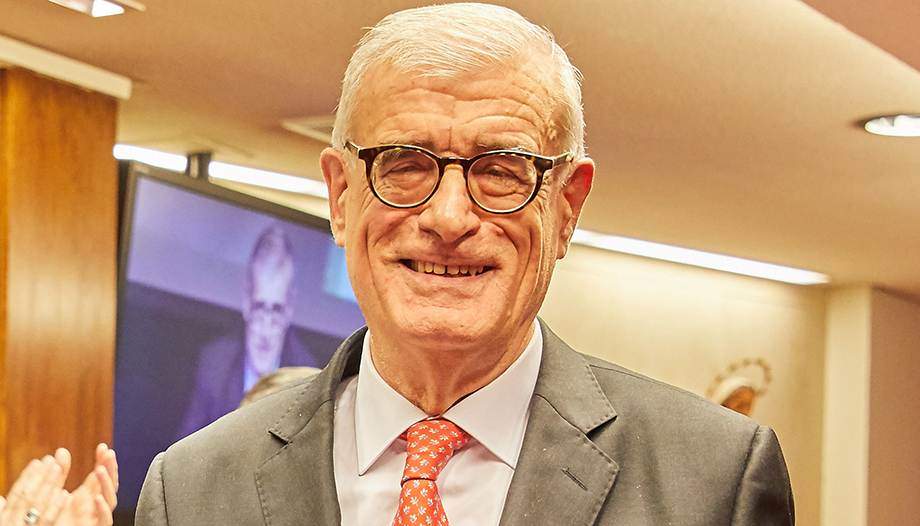It is called Manuel Garrido González but for communication professionals in Spain it is Manolo.
This journalist from Oviedo, who is almost 68 years old, has dedicated his professional life to institutional communications in the Catholic Church, especially at the Torreciudad Sanctuary and in the Communications Office of the Opus Dei Prelature. Now he combines consulting work with a determined fight against an illness, which he faces with "the confidence that comes from being in the best hands: in those of God, in those of the doctors and in those of so many friends and colleagues, who help me with their affection and closeness.
On January 29, 2024, Manuel Garrido picked up the Award Bravo! of Institutional Communication. Alongside him, names such as Ana Iris Simón, film director Santos Blancoor the creators of the campaign for the ACdP #ThatDoesn'tGetYouSpun in favor of the family and motherhood received this recognition, awarded by the Spanish Episcopal Conference.
On that day, many colleagues wanted to accompany Manuel Garrido in the presentation of an award that he gave to all communication professionals.
How did you receive the award Bravo! What does such recognition mean after years of work and service?
-Surprisingly, I was not expecting it. In any case, I welcome this boost of encouragement that comes from my colleagues in the informative tasks, to whom I offer it. And it is a luxury to receive it together with some extraordinary, high-level award winners, such as Ana Iris Simón, whom I follow on a weekly basis. She recently referred to the importance of looking ahead without losing sight of the past, to appreciate so many good, beautiful and true things. And to have a clean look to know how to appreciate them and tell them. I wrote it down, it seems to me a good advice.
You have experienced firsthand the change in communication paradigms and in the Church. How do you deal with professional problems when they also affect your own faith?
-Faith leads you to prayer to see with God the things you have in hand, to try to work with joy and hope. It is not passivity or laziness, or tododa igualThe aim is to achieve quality without perfectionism, to try to do things well, in spite of mistakes.
Faith gives you a perspective that helps you in the immediate overwhelm, it takes away the limelight and importance and helps you to see things in their right measure. It is more than an ally in the day to day. And at the same time it is comforting to see so many positive behaviors that build and are in the majority. They are the ones we have to tell and share, which will make the face of the Church more friendly.
What communication moments do you take away from your career?
-I could say that I have enjoyed every piece I have prepared, looking forward to seeing it published or broadcast in whatever medium. Having said that, I would choose the beatification and canonization of St. Josemaría, which I experienced in Rome with my fellow Barbastro residents and which was followed by numerous media outlets. And I would also highlight, as a moment, I have been in charge of the communication between Torreciudad and Alto Aragon for 21 joyful years, during which I have been able to see what a great gift the sanctuary is for the Church, the diocese and the territory. And we must continue to take care of it together.
In your opinion, what should be the keys to communication in a Church institution?
-I see two keys. Closeness and personal affection for the professionals and offering the media useful information. Those of us who are in the field of institutional communication must be intermediaries between our institution and the media. Therefore, get to know your house and the media in depth. And then frequent contact with the media to offer them information that is useful to them.
In an increasingly "digital" world, has personal contact been lost in the professional arena?
-I think that journalism is carried inside and lived 24 hours a day, although I understand that this is no longer the case and I'm glad, because now it is being reconciled more with other obligations. But I will say that if you follow a colleague's work closely and talk to him or her, it is easy to share other things. It's caring, not marketing or coaching. Every colleague is a person, not a threat or an instrument, said St. John Paul II, who thought of journalists as people and tried to establish personal contact with them. It is sincere, supernatural and joyful closeness, as we have just seen in Pope Francis and his January 22 audience with accredited journalists at the Vatican.
In your life, do you have any communication reference?
-Joaquín Navarro-Valls. I had the good fortune to know him and follow him. I recently read his personal notes in "My years with John Paul II", in Espasa. I found it very useful and I recommend it for any communicator, because he was a great spokesman for a great pope.
I well remember Navarro's conference on 18 November 2013 at the Rafael del Pino Foundation on John Paul II and human suffering, which was very thought-provoking. And I have at hand some words from 2011 that have helped me a lot: "everything can be communicated and much should be communicated; also pain, illness and even doubts. The only thing that cannot be communicated is a lie, not even to make oneself look good and improve one's image". Quite a challenge.








